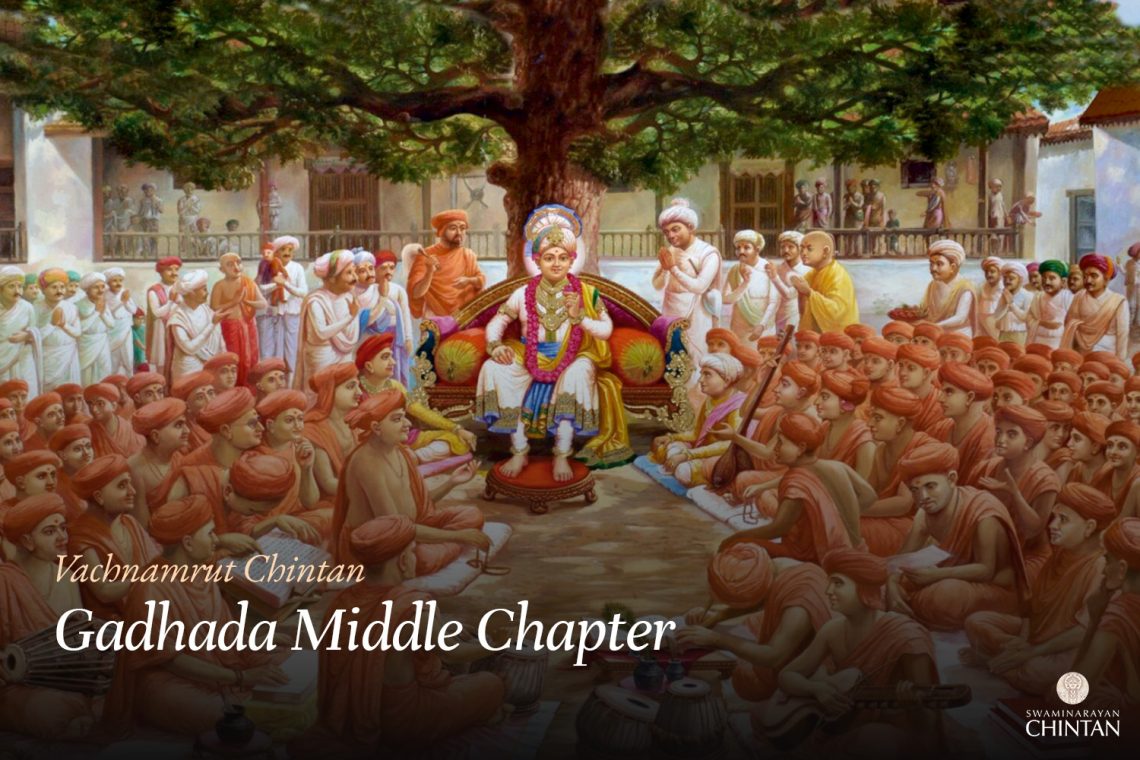Central Insights:
- Two types of Kusang (evil association) that must be avoided.
Key Points:
- Understanding the viewpoints of the atheist and the dry Vedantist.
Explanation:
Maharaj says, “I have reflected on all aspects, and I have realized that among all the forms of kusang (evil association) in this world, the most dangerous is the company of someone who lacks devotion to Bhagwan and does not believe that Bhagwan is the supreme master of all, that He is Bhaktavatsal (lover of His devotees), Patit Pavan (sanctifier of the fallen), and Adham Uddharan (redeemer of the lowly). There are two such types of people: one is the atheist, and the other is the dry Vedantist. These two are the most severe forms of kusang.”
Maharaj continues, “If one develops affection for them and associates with them, the first thing that happens is the destruction of one’s belief in the existence of God, which is caused by atheists. On the other hand, the dry Vedantists ruin the practice of upasana (worship) and devotion to Bhagwan. Therefore, one should avoid their association.”
Atheists believe that by performing good deeds, one can attain knowledge of Kaivalya (liberation), and by practicing austerity, bad deeds are erased. Once all deeds are exhausted, they think they become God themselves, and thus, they believe in an infinite number of gods. The issue arises when they gain virtues through good actions, but if one becomes fond of their philosophy and starts following it, the path to ultimate salvation is lost. They recognize good and bad actions but do not acknowledge Bhagwan as the giver of the fruits of these actions. They do not believe in the existence of one supreme Paramatma (Supreme Soul) who controls the universe and dispenses the fruits of good and bad deeds. Instead, they believe that Ramchandra and Shree Krishna were not gods but merely kings, and that they ended up in the third hell. This is the essence of extreme kusang. According to them, there is no eternal Paramatma. Their understanding of the Veda and Shastra (scriptures) is completely wrong.
The dry Vedantists, on the other hand, believe that Brahm (the supreme reality) itself has become all the individual souls, just as the sun’s reflection appears in many places. They believe that once they realize “Aham Brahmasmi” (“I am Brahm”), they themselves become Paramatma. From then on, they believe there is no need for any spiritual practice. Since they consider themselves to have become Paramatma, they see no need to engage in worship or offer salutations. This leads to extreme arrogance, and their path ultimately destroys Bhakti (devotion) and upasana.
Maharaj also acknowledges the importance of Vedanta, stating that the true result of listening to Vedanta is the awakening of devotion to Paramatma. However, instead of fostering devotion, these dry Vedantists lose even the little devotion they might have had. Therefore, their understanding is also contrary to the teachings
of the Veda and Shastra. Even great sages like Narad, Sanakadi, and Shukji know Vedanta, yet they remain in the utmost servitude to Paramatma. Meanwhile, these small-minded dry Vedantists consider themselves equal to God. This is the most dangerous form of kusang, and our devotees should stay far away from it.
Glossary
| Kusang – Evil Association Association with individuals or ideologies that destroy faith in Bhagwan and devotion. |
| Atheist – Non-believer in God A person who denies the existence of Bhagwan and rejects His role as the giver of the fruits of actions. |
| Dry Vedantist – Misguided Vedanta follower One who misinterprets Vedanta, claiming they themselves become Paramatma and rejecting devotion and upasana. |
| Bhaktavatsal – Intense Lover of His devotees A divine attribute of Bhagwan, indicating His deep affection for His devotees. |
| Patit Pavan – Sanctifier of the fallen A title of Bhagwan, referring to His ability to uplift those who have fallen into sin. |
| Adham Uddharan – Redeemer of the lowly A title of Bhagwan, emphasizing His role in liberating those in the lowest states of life. |
| Kaivalya – A state of ultimate freedom, which atheists mistakenly believe can be achieved without Bhagwan. |
| Paramatma – Supreme God God, the all-pervading and ultimate reality. |
| Aham Brahmasmi – “I am Brahm” A Vedantic phrase, misunderstood by dry Vedantists to claim equality with Bhagwan. |
| Brahm – Supreme Reality, God The ultimate truth in Vedanta, often misinterpreted by dry Vedantists. |
| Upasana – Worship and devotion The practice of deep meditation and attachment to Bhagwan. |
| Bhakti – Devotion Loving and selfless worship of God. |
| Vedanta – Conclusion of Vedas The ultimate philosophical teachings of the Vedas that describe the nature of God and liberation. |
| Narad – A divine sage Renowned for his devotion and spiritual teachings, often serving as an example for seekers of liberation. |
| Sanakadi – Four eternal sages |
| Shukji – Sage Shukdev A sage known for his unwavering focus on the soul and devotion to God, often exemplifying Atmanishtha. |
| Veda – Ancient Four Eternal Scriptures |
| Shastra – Holy Vedic Scriptures Texts that provide spiritual and philosophical guidance for God- realization & Liberation |

